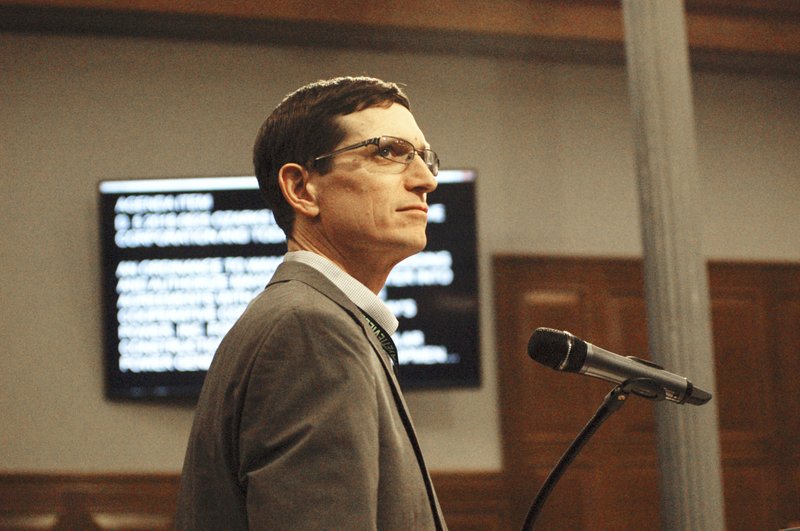FAYETTEVILLE -- Wastewater treatment in the city will get a little greener.
The City Council voted 8-0 to approve a 20-year agreement with Ozarks Electric Cooperative and Today's Power Inc. to install solar panels at the city's two wastewater treatment sites.
Other action
Fayetteville’s City Council met Tuesday and approved:
• Appointing Marsha Scott to the Town and Gown Committee
• A contract with Electrical Resources to install lighting on 3 miles of the Cato Springs Trail
• Rezoning a lot south of Poplar Street and Gregg Avenue. Planners said two single-family homes could be possible with two accessory dwelling units apiece.
Source: Staff report
The two plants -- the Paul R. Noland facility on the east side of town and the Westside Wastewater Treatment plant -- make up about 67 percent of the city's overall electricity use. The City Council in January adopted an energy plan seeking to run all city facilities on 100 percent clean energy by 2030.
Currently, 16 percent of the city's energy use is classified as clean, Sustainability Director Peter Nierengarten said. Installing the panels will bring the total to 72 percent, according to city documents.
Nierengarten said the city is projected to save $6 million in energy costs over 20 years, and will get a return on the investment within three years.
Today's Power will lease about 87 acres from the city to place the panels near the plants. The company will operate and maintain the arrays, but the city can buy the equipment at a depreciated cost, Nierengarten said. The price the city pays Ozarks Electric for electricity also will be reduced, he said.
Ozarks Electric is part-owner of Arkansas Electrical Cooperatives. Today's Power is a subsidiary of Arkansas Electrical Cooperatives.
The city and project partners will work to integrate native plants around the arrays, rather than gravel or pavement. The system will use battery storage to distribute energy when the sun isn't shining.
"These are the kinds of steps where we'll make not only a better city, but a better world for everybody," Mayor Lioneld Jordan said.
Coincidentally, the council voted 8-0 to preserve 44 acres of the Woolsey Wet Prairie. The area serves as home to a variety of flora and fauna, and is a designated Important Bird Area by the Audobon Society.
Jennifer Ogle, with the Fayetteville Natural Heritage Association, told the council much of the city's prairie land surveyed in the 1800s has been built on. The Woolsey Wet Prairie represents probably the only patch of public land in the city of the larger prairie stretching from Prairie Grove to North College Avenue, she said.
In other business, the council voted 5-3 to rezone property in the Walker Park neighborhood. The rezoning changes the patch of land from a primarily single-family designation to one allowing a variety of housing types, including duplexes, triplexes and quadplexes. The original single-family zone is called neighborhood conservation and the rezone is called residential intermediate-urban.
Michael Ward, representing the property owner, said plans haven't been finalized but it's possible three two-story houses could go there.
Seven residents spoke, all but one of whom opposed the rezoning. Several brought up the Walker Park plan developed a decade ago, saying the proposal goes against it.
Council member Sarah Marsh said no matter what type of residential use goes in at the spot, it has to be of similar scale to a single-family home, per city code.
Council member Mark Kinion said the neighborhood plan was adopted in good faith, and the identity of the neighborhood should be conserved as promised.
The council also approved the budget for next year. The $168 million overall budget is about $7.2 million more than this year's adopted budget. The biggest operational chunks are dedicated to personnel, about $57 million, and services, about $22 million. Personnel rose about 6 percent, while services went up about 4 percent.
NW News on 11/21/2018

